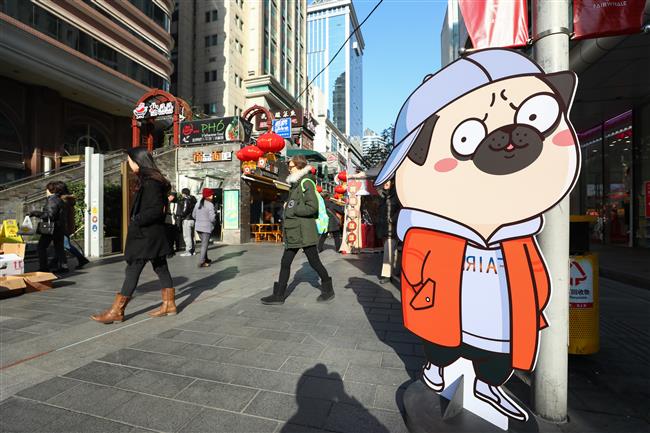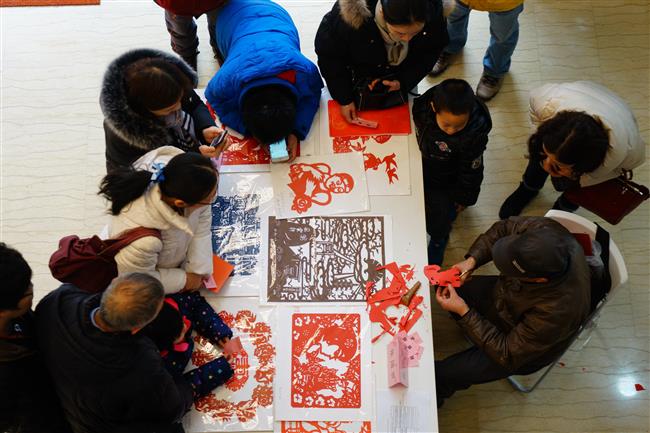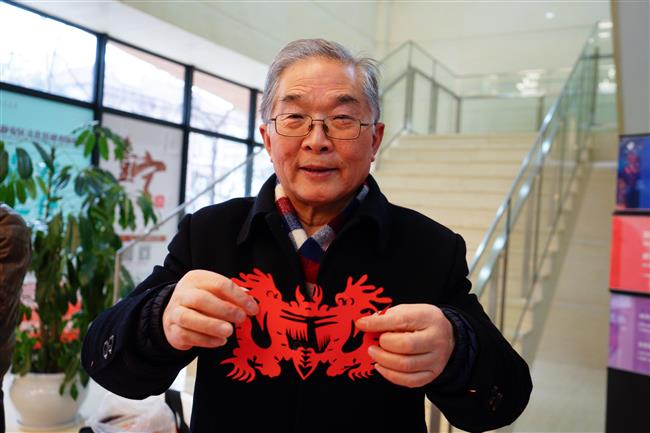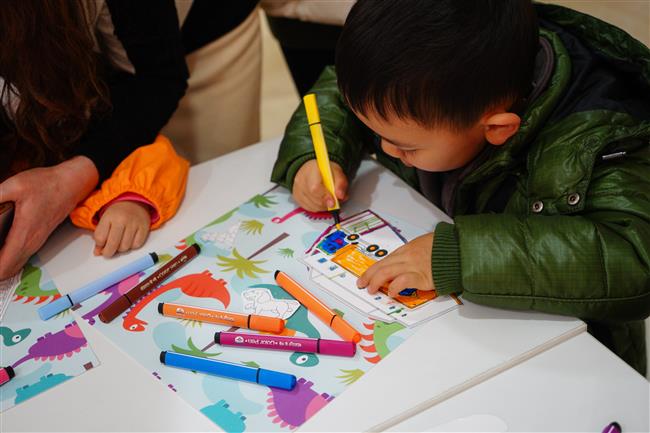How we rang in the Chinese Year of the Dog

Traditional handicraftsmen are invited to open stalls, making dough and sugar figurines and doing paper cuts on the Wujiang Road through March 2.

A Guai takes the Year of the Dog literally. The canine took his online stardom offline at a promotional campaign on Wujiang Road during the Spring Festival holiday.
The pug whose mug is an online sensation
Chen Zhe, 31, who runs an ad company in Jing’an, was hard at work during the Spring Festival holidays.
He was involved in a campaign to promote online celebrity A Guai, who will be appearing through March 2 on Wujiang Road.
A Guai, which literally means “freak,” is Chen’s four-year male pug dog. “My friend sent him to me four years ago,” Chen said. “He looks strange, and his voice sounds like grunting pig.”
Despite the dog’s somewhat unfortunately demeanor, Chen said he fell in love with the pug.
“He is an optimist who lives a carefree life,” Chen said. “He is afraid of nothing, and never flees from bigger dogs. He can always find the most comfortable place, anywhere, to lie down for a rest. And he loves to eat.”

Chen Zhe and A Guai.
Early last year, Chen decided to share his pet with others. He created a set of emoticons, inviting people to download them on WeChat.
The emoticons, with a cartoonish A Guai in different poses, quickly went viral, downloaded tens of millions of times. Encouraged by the growing fan base, Chen opened a WeChat account for A Guai, which now has more than 500,000 followers.
“They can download wallpaper for mobile phones and buy related products, like A Guai stuffed toys,” Chen said. “The event on Wujiang Road will be our first offline promotion.”
Cardboard cutouts of A Guai will be placed there for people to take pictures. Traditional handicraftsmen have been invited to open stalls, making dough and sugar figurines and doing paper cuts.

Papering activities in the Jing'an Cultural Center
Scissors paper the town a festive red
Ahead of the Spring Festival, Sun Jihai, 69, an expert with scissors, cut red paper decorations used by Chinese for festive occasions and gave them to people in the Jing’an Cultural Center.
“I didn’t charge them anything because what I just wanted to share traditional culture,” he said. “People are easily attracted by giveaways. I like it when they stop to talk to me about the history of paper-cutting in China.”
His gesture was so popular that Sun barely had to take a break for a drink of water. People came to him asking for traditional cutouts, like the 12 Chinese zodiac animals.
Paper-cuts used to be ubiquitous in China. Patterns with auspicious meanings were cut from paper and hung on windows and doors during festivals and for special occasions like weddings. But the custom has faded in big cities in modern times.
To keep such cultural heritage alive in contemporary society, Sun has held a variety of events to teach people the ancient folk art. His “students” have included children and the elderly.
“It’s simple, and everyone can do it,” he said.

Sun Jihai shows off his paper-cutting work

Traditional Chinese paper-cutting delights the young people.
While Sun was working his magic in the Jing’an Cultural Center, a group of children nearby worked on modern interpretations of traditional paper-cuts.
Their artwork included coloring in cutouts of local landmarks, such as Jing’an Temple and the Paramount dance hall.
“We want to perpetuate the charm of papercutting,” said center official Xu Qiyao. “We cut out the landmarks for the children to color in. We hope this instills pride in them for the district.”

Liu Zhihong cooks duojiao yutou.
Spicy start livens up a new year
Liu Zhihong, 47, came to Shanghai from Hunan Province 22 years ago, marrying a Shanghai man and living in a traditional lane-style house.
She loved her new home but couldn’t forget the spicy flavors of her origins. So she cooks specialties from her hometown to this day. For Spring Festival, she prepared duojiao yutou, or fish head steamed with chopped chili peppers.
Like Sichuan, Hunan is home to China’s spiciest cuisine. Duojiao, a signature dish of Hunan, uses pickled chili sauce made from fresh hot chilies. Paring the sauce with a steamed fish head is among the most famous dishes.
“Every Hunan family makes this dish on special occasions,” Liu said.
In Chinese, the pronunciation for “fish” is yu, the same as the word “sufficient.” Also, red in China carries an auspicious meaning.
Liu’s secret menu is her homemade red chili sauce.
“I changed the ingredients a bit,” she admitted. “And I use peppers grown in Shanghai, which taste a little bit sweeter.”
She buys peppers when they are at their peak in autumn, seasons them with salt and seals them in jars to pickle.

Liu Zhihong’s signature Hunan dish duojiao yutou
Liu now works for the old Shengping neighborhood of the Nanjing Road W. When she first came to Shanghai, she sold newspapers to make money.
“I couldn’t speak the Shanghai dialect, so many people just passed me by and bought newspapers from a native competitor,” she said. “But everything has changed since then. Shanghai has become more open and inclusive.”
When she moved to the Shengping neighborhood more than 20 years ago, she, her husband and child lived in a cramped 20-meter-square room.
“We had to share a kitchen and toilet with four other families,” she said, adding that everyone was quite good at keeping “proper distances” with others.
“At that time, we all had one water meter,” she said. “I remember I was once asked to pay 5.56 yuan, and I gave the person collecting 5.6 yuan. But the person insisted on giving me 0.04 yuan in change. That was so heartening.”
A district-wide overhaul of old houses has given Liu and her family their own kitchen and toilet facilities.

White-collar workers based in Jing’an gather ahead of the Spring Festival to celebrate the launch of a set of emoticons especially designed for them.
Grain of rice celebrates home flavors
China is known for its wide variety of regional cuisines. Every hometown has a signature dish that brightens up Spring Festival family dinners and evokes happy memories among locals, no matter where they eventually live.
Playing on such tradition, a Jing’an social group created a set of emoticons using a cartoonish grain of rice added to signature regional dishes and uploaded it on WeChat.
Examples include the cartoonish rice stuffed into the classic Hangzhou dish xihu cuyu, or West Lake fish in vinegar gravy, alongside the traditional Chinese blessing of nian nian you yu, or “plenty to spare, year after year.”
“Jing’an white collar workers come from everywhere,” said Shi Yichan, who heads a district social group called Bailing Yijia, or “post house for white collar workers,” and released the set of emoticons.
“I hope people used the emoticons during Spring Festival and sent them to friends, both in their hometowns and Jing’an as well.”
Bailing Yijia, set up in 2009, has organized a variety of activities for local white-collar workers, providing a platform to make friends and find soulmates.
“We have members volunteering to help our operation and create hobby groups,” Shi said. “They come up with ideas and organize activities by themselves.”

A white-collar worker uses emoticons of "grain of rice."
















